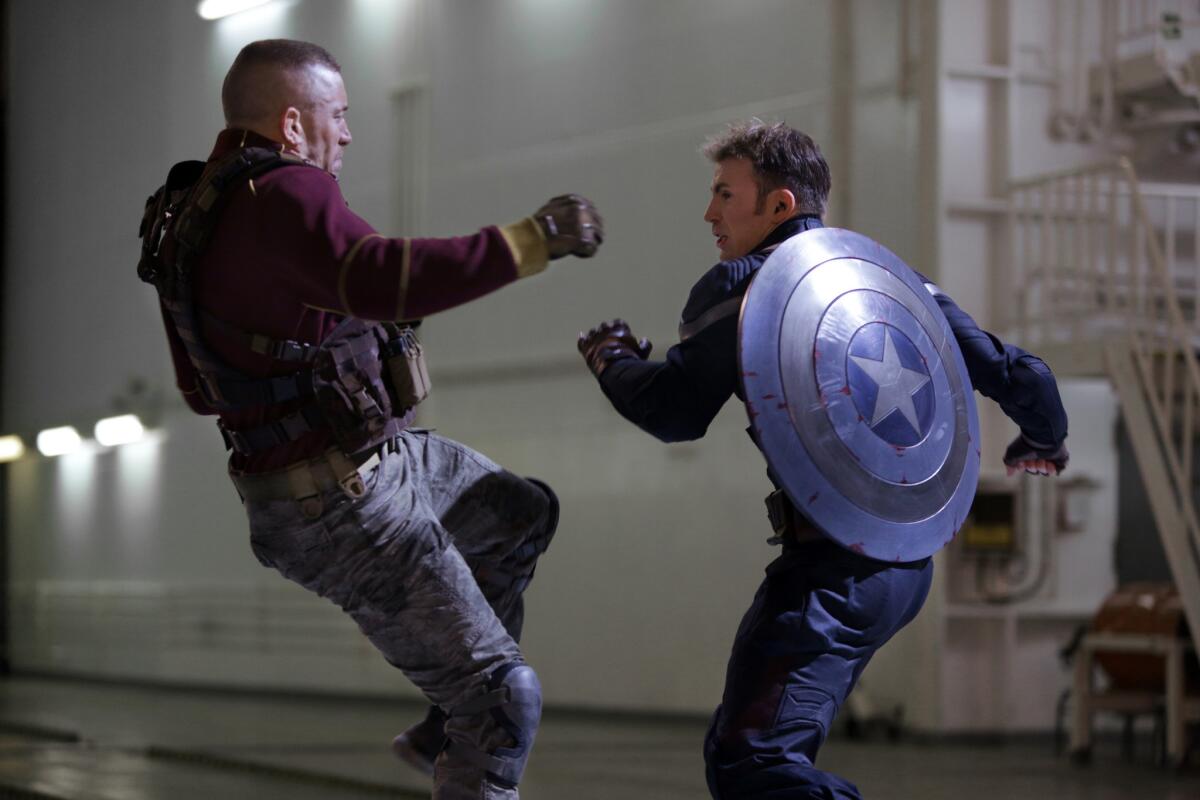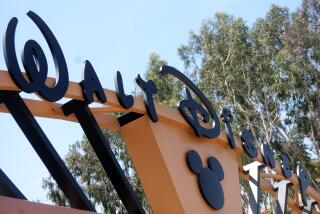Disney quarterly profit surges 22% on film studio hits; revenue up 8%

Led by its cast of brawny superheroes, a villainous queen and one plucky animated princess, Walt Disney Co.’s film studio drove the company to a 22% increase in net income for its fiscal third quarter.
The company posted net income of $2.25 billion for the quarter that ended June 28, up from $1.85 billion a year earlier. Revenue rose 8% to $12.47 billion.
Disney, the world’s largest entertainment and media company, delivered earnings per share of $1.28 — the highest in the company’s history. In doing so, the Burbank company beat analyst expectations of $1.17 a share, according to investment research firm Zacks.
The studio was the star of the show, with operating income surging to $411 million from $201 million a year earlier. Revenue rose 14% to $1.81 billion.
Disney released two major hits during the quarter: “Captain America: The Winter Soldier,” which has grossed $714 million worldwide; and “Maleficent,” which has taken in $729 million and stars Angelina Jolie as the titular queen. Those films came on the heels of the animated blockbuster “Frozen,” which has grossed $1.28 billion after bowing in November and remains in theaters in Japan.
The quarterly results did not include the performance of the company’s latest hit, “Guardians of the Galaxy,” which debuted Friday and has already generated more than $180 million in box-office receipts. Disney said at Comic-Con in late July that it would release a sequel to the film in 2017.
“The studio has been hitting it out of the park — it is a perfect storm, and the stars have never been more aligned,” said Tuna Amobi, an S&P Capital IQ analyst, who has a “buy” rating on Disney’s stock. “Sure, they are going to have their hits and misses, but it just seems like the misses have been few and far between.”
Indeed, Disney has not released a high-profile disappointment since last summer’s “The Lone Ranger.” That film, a Johnny Depp-starring western, had a production budget of at least $225 million, but grossed $261 million worldwide.
Analyst Robin Diedrich of Edward Jones Research said that the success of the studio is important for Disney because it provides a “trickle-down effect” to other divisions.
“Frozen,” about a princess’ journey to save her sister, has spawned a lucrative line of merchandise and will become a Broadway play. And in May, Iger said that Disney was “developing some concepts around” increasing the picture’s presence at its theme parks. Also, characters from “Guardians of the Galaxy” will appear in the next iteration of the company’s “Disney Infinity” action-adventure video game, which comes out next month.
“This has always been the goal,” Diedrich said of Disney’s ability to take successful films and exploit those properties across other platforms. “That’s the difference between what Disney has done compared to other companies.”
During a conference call with analysts, Disney Chairman and Chief Executive Robert Iger was asked whether the film studio could possibly do better.
He cautioned that “over time … every single film will not work. I’ve been in the business long enough to know that. I can’t tell you which one won’t right now, but that’s the business.”
But Iger said that the company’s stable of properties and filmmaking team give it “a much greater likelihood of sustainable success.”
Disney has built its trove of valuable intellectual property in part through acquisition. Disney bought comics juggernaut Marvel Entertainment for $4 billion in 2009, and acquired Lucasfilm — with its “Star Wars” franchise — for $4.05 billion three years later.
Diedrich said that at the time of those purchases, some observers viewed the deals — and the previous acquisition of Pixar for $7.4 billion — as “a little scary” because of the high price tags. “But there are not that many big franchises that you can buy, so you tend to have to pay up,” said Diedrich, who rates Disney shares a “buy.”
She said the Marvel and Pixar deals were victories for Disney, and believes that the Lucasfilm acquisition should also pay dividends if Disney’s relaunch of the “Star Wars” film series is a success. The first new “Star Wars” movie, directed by J.J. Abrams, will debut Dec. 18, 2015.
Iger said that the company is “developing ideas and designs for a far greater ‘Star Wars’ presence in our parks,” and would provide more details about the planned expansion next year.
In addition to the studio, Disney’s parks and resorts, consumer products and interactive divisions each experienced double-digit operating income growth on a year-over-year basis.
The company’s media networks division, which includes ESPN and ABC, posted operating income of $2.3 billion, flat from a year earlier.
Disney shares, which fell 49 cents, or 0.56%, to close Tuesday at $86.75, were up slightly in after-hours trading.
Twitter: @DanielNMiller
More to Read
From the Oscars to the Emmys.
Get the Envelope newsletter for exclusive awards season coverage, behind-the-scenes stories from the Envelope podcast and columnist Glenn Whipp’s must-read analysis.
You may occasionally receive promotional content from the Los Angeles Times.







